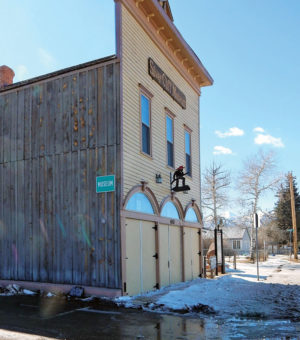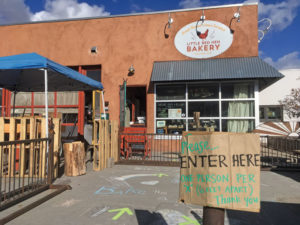By George Sibley
We’ve been told recently that we are “living in a historic time,” but maybe I’m not alone in observing that there is a big difference between “living in a historic time” and actually “making history.” What we are mostly doing today is hunkering down, lying low, invisible we hope to a cute little malignant virus.
We’ve actually done well in Gunnison County in addressing the novel conronavirus (novel?). Back in early March we were one of four counties in Colorado with the highest per capita incidences of people reporting COVID-19 symptoms—all four counties in “Ski Country USA,” so no surprise there. Between the ski resort and the university here, with so many people coming and going from everywhere, the Upper Gunnison country always cooks up a great winter microbial stew.
But our county Health and Human Services people jumped on it really fast—faster, really, than anyone else except the San Francisco Bay area. The Upper Gunnison Valley was essentially on full “shelter-in-place,” with all but essential businesses closed, more than a week before that was decreed for the state, with the nation bumbling along reluctantly even later. The CDOT traffic alert signs at either end of Gunnison (ironically only visible as one is leaving Gunnison) advertised that “Gunnison County is Closed.”
We were also out in front in asking visitors not to come, and if they were already here, to please go home. This was done out of concern that the local population alone (around 16,000) could, in one relatively modest coronaburst, overwhelm our relatively small local hospital and its response facilities; we had already sent several patients to Montrose and Grand Junction due to a shortage of ventilators.
The request to stay away or leave was, however, perhaps not expressed as diplomatically as it might have been, and some of our second-home owners took umbrage at what they interpreted as yet another offense against sensitive wealthy people. And lest anyone doubt that Texas has a kind of colonial perspective about Colorado, the Texas Attorney General lectured us in an early April letter, for discriminating against wealthy Texans. This was despite an online “exemption” form for second-home residents already in the valley, which 200 of them used. But since then, whole states—including Texas!—have employed similar policies, asking people to not come visiting, and quarantining those who do when and if they catch them.
All of this has definitely “flattened the curve” of the pandemic’s expansion here. There is, however, a growing aura of unreality, or maybe surreality, about all of it. It’s so quiet, with the engines of production and consumption cut back or shut down.
Listening to the quiet, I am reminded of the famous statement by British Prime Minister Margaret Thatcher—saying out loud what all real conservatives want to believe: “[T]here’s no such thing as society. There are individual men and women and there are families. And no government can do anything except through people, and people must look after themselves first.”
Well, we seem to be, right now, immersed in Thatcher’s nonsociety: our governments, local to national, are telling us to just look after ourselves and our families for the time being, and they have decided that the best way for us to do that is to eliminate as much social and economic interaction as possible. Except for “essential services”—groceries, water, energy, liquor and pot to help us put up with things until they don’t, and, well, everything at Walmart (how did they slip through?)— there is, by edict, for the time being, no society. Or at least only minimal society, as we look after ourselves first.
“Kinda nice, isn’t it,” we might be saying, in Zoom meetings with people we used to go out to have a beer with: “So quiet.” Nice and quiet. But we are aware that part of that quiet is the quiet desperation of those whose employments have been deemed non-essential, those “trapped in place” with desperate partners whose outlet is frequently domestic violence, those looking at homelessness because of landlords unwilling to cut a deal, those going without food in order to give what they have to their children—in general, the desperate quiet of those who have drunk the Repugnican Kool-Aid that if you are poor and “non-essential,” it’s your own fault and your own insufficiency, so buck up and get it together, laddies and ladies—look after yourselves!
Shutting down society was a necessary and courageous step, when it was done. A historic response to a very real threat: shut down the currents of microbial exchange between individuals by shutting down most of the channels of exchange. It does seem to be working, here and in other places where it is being seriously followed.
But it also becomes clear that the health of our society—those channels of exchange, all those social and economic interactions—is also a big part of our individual health. Without those societal currents flowing, the interactions that enable us to “look after ourselves” —jobs—disappear. And since we’ve rigged it so those who do the most basic work in sustaining society are also the worst paid, the pain starts almost immediately for those for whom there is never enough left over to save for a droughty day.
It has become necessary to create some sort of makeshift society to restore at least some flow of basics in the channels of societal exchange, and there are some noble efforts underway—local food pantries working overtime to find and distribute free food (but still overwhelmed by need); restaurants preparing food they can’t sell for delivery to the growing number of overworked and underpaid families, now unemployed; churches putting together food packages for schoolkids who depended on food they got at school; volunteers delivering food to seniors; local councils trying to make foreclosures, evictions and other legal measures at least disreputable.
These measures are all temporary and unsustainable for the long haul, and the real challenge now is to figure out how to restore a functional society without stirring up a new pandemic wave. The quiet is already being disrupted by a growing noise from the MANA mobs – the “Make America Normal Again” Trumpistas. “MANA” is really what “MAGA” has always been; Trump and the Trumpistas have no conception of genuine “greatness”; they are just nostalgic for their selective memory of “normal.” It’s clear that this noise is Trump-driven (‘LIBERATE MICHIGAN! LIBERATE VIRGINIA!), not to help the nation but to help his re-election hopes.
What we really need to do right now is to keep the makeshift society going for a while longer, during which borrowed time we can hope the scientists will be able to solve the coronavirus testing challenge, which would enable us to identify the viral “haves” from the viral “have nots” and “hads,” so we can begin reconstructing a functioning society around the latter groups.
And then—what we need to do at the same time is contemplate making history by thinking through what aspects of society we really want or need to restart—and what we should use this opportunity to change or just get rid of. Remember that just getting past the virus won’t let us live happily ever after; looking over the shoulder of the corona crisis is the climate crisis, the health care crisis, the growing pressure to address the inequality between old-style haves and have nots – et cetera: all the aspects of “normal” that are not so great.
For example—instead of just cranking up the old economic society of mindless consumption, converting fossil energy resources to greenhouse gases in order to convert planetary resources to landfill material, why not reset our economic bearings on production of renewable energy and sustainable infrastructure, with all the job opportunities available there?
And health insurance—how are those “beloved” employer-based private plans working out now, for those for whom the insurance disappeared with the job? Is it time to finally start the ten-year transition to a national plan where a big piece of your “premium” —taxes—doesn’t have to go to private profits (and paying a couple layers of employees to deny your claims in order to insure those profits)?
There are other opportunities to make history rather than just docilely repeating it: installing a fee on the rapid-fire computer-generated stock transactions that do nothing for the society except further its inequities; re-empowering Elizabeth Warren’s Consumer Financial Protection Bureau; restoring the legal right of all living things to clean air and water—et cetera. One could go on.
There are somewhere between 22 and 25 million unemployed working people desperate but growing righteously angry, some of whom at least must see that it is time to demand more than just “make America normal again.” Normal hasn’t been all that great —and it’s getting worse for us humans with every ton of greenhouse gases, driven by every rise in the Dow-Jones. Even a small percent of 25 million could drown out the hundreds of MANA Trumpistas, and start to make history. (Dream on, Sibley.)
George Sibley writes and rabble-rouses from Gunnison. george@gard-sibley.org
Down on the Ground is sponsored by Tom Arnot and Rae Pederson.



